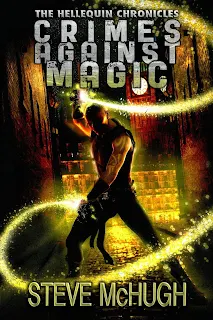I'd like to welcome author, Steve McHugh to my blog! He's out and about promoting his re-released Hellequin novels...check the links below for further details!
So, you’ve written your first ever book. Go you; you’re now
in the minority of people who say they’re actually going to do it. And with the
ever-increasing change of the publishing landscape, you’re thinking, “do I just
publish this myself? Or do I go the traditional route and try to get an agent
and publisher.”
And the answer to that question, my good person, is the
latter of those 2 choices.
Now, some of you might know that I’m a self-published author
(or indie if you’re so inclined). I love indie writing. Without it, I wouldn’t
have published 2 successful books last year, Crimes Against Magic and Born of
Hatred. I wouldn’t have gotten a contract with 47North, Amazon’s SF, fantasy
and Horror imprint, and those first two books wouldn’t have been re-printed on
17th September. Indie
writing has been good to me. As it has to a lot of my friends.
So, yeah, you’re probably thinking I’ve either sold out or
gone crazy. But here’s the thing, I tried to get an agent. Now, I didn’t
self-publish just because I got a few dozen rejections, I self-published
because for me it was the right thing to do. And that might well be the case
for you. But if this is your first book, if this is your first time about to
step into that rollercoaster world of publishing, I would suggest that you at
least give the traditional way a go.
Now, that’s not because I think it’s better, because that’s
nonsense. It’s because you need to get rejected. You need to get those
rejection letters from agents who either don’t think it’s good enough, or don’t
think they can sell it.
Rejection sucks, there’s no easy way to say it. Those form
rejections are the worst thing on earth when it comes to trying to get an
agent. They tell you nothing of use, except they didn’t like the book. Now, I
understand why agents do it, if they didn’t they’d spend all day just typing
out, “I didn’t like your book because…” letters, but they still suck.
Occasionally you’ll get something other than a form letter,
something telling you about why they didn’t pick your book. And those letters
are both incredibly crap and fantastic. You have feedback. And you can either
ignore it or you can try to work with it. Your choice. But experiencing it, the
highs of getting a reply and lows of it being rejection will prepare you for
when you’re published.
When your book is finally out there, people are going to
love it and hate it. There will be reviews, maybe even e-mails. You won’t agree
with many of them, hell it’s your baby and they’re being mean about it, but you
will need to get a thick skin and quickly. Rejections letters help here.
Because no matter what the review, you’re published, you got past the guardians
of publishing and went your own way.
Besides, if there’s one very good skill all writers hate and
all writers need, it’s writing query letters and synopsis. And that’s something
you’re going to get a lot of practice
at.
So, give yourself 6 months, 12 months, whatever feels right,
and try to get an agent. Hell, you could do manage to get an agent in that time
and then you’ve got a whole new set of circumstances in front of you to deal
with. But if you don’t try, you’ll always wonder ‘what if’ and you’ll never
know that sting of a form rejection and the elation of picking yourself up,
dusting yourself off, and doing it all again.
Steve
McHugh lives in Southampton on the south coast of England with his wife and
three young daughters. When not writing or spending time with his kids, he
enjoys watching movies, reading books and comics, and playing video games.



Comments
Post a Comment